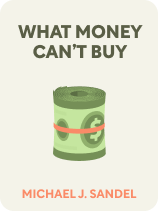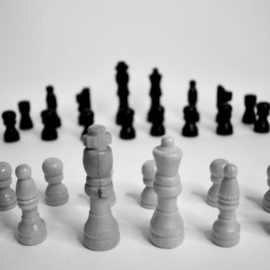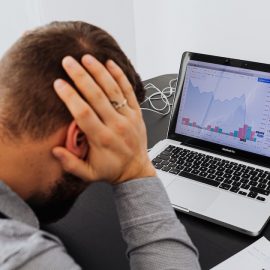

This article is an excerpt from the Shortform book guide to "What Money Can't Buy" by Michael J. Sandel. Shortform has the world's best summaries and analyses of books you should be reading.
Like this article? Sign up for a free trial here .
What are the benefits of a free-market economy? What are the main arguments given in favor of the free market?
In his book What Money Can’t Buy, philosopher Michael Sandel argues that free-market societies are immoral and create corruption. He starts his book by explaining the three arguments that defenders of the free market often make: the efficiency argument, the utilitarian argument, and the libertarian argument.
We’ll go over each of the three arguments below.
What Are Market Values?
In his book What Money Can’t Buy, Michael Sandel defines market values as the logic, attitudes, and assumptions that govern markets—where there’s no limit on what’s for sale as long as someone’s willing to buy it, and individual self-interest trumps the common good. Below, we’ll explore the primary benefits of a free-market economy, according to its defenders.
1. The Efficiency Argument
Sandel writes that supporters of market values claim free-market economies are the optimal (most “efficient”) way for society to distribute scarce resources. The primary way the market allocates resources is through the price system. In a free price system, there is no need for an external actor (like a government or regulatory authority) to limit or set quotas on what goods or services are to be produced—prices do that on their own, determining what goods are to be produced, in what quantities, and who will get them.
The invisible hand of supply and demand, according to the free-market argument, provides the key self-correcting mechanism that makes the price system work. For example, when the price of Good A increases, consumers start to demand less of it or find alternatives for it. This drop in demand signals suppliers to reduce its price and produce less of it. On the other hand, when the price of Good B decreases, consumers will begin to demand more of it. This rise in demand acts as a signal to suppliers to increase the price and produce more of it.
(Shortform note: As Thomas Sowell explains in Basic Economics, suppliers have a financial incentive to match their supply to consumer demand. This is what makes the market self-correcting and “efficient.” If vendors supply more goods than consumers demand at a given price, they sit on unsold goods and suffer a loss of profits. Similarly, if they supply fewer goods than the market demands at a given price, they run out of stock and lose out on potential profits.)
These price mechanisms are cyclical: After the price of Good A begins to decrease, demand for it will increase once again, which will lead the price to increase, which will reduce demand, and so on. Similarly, after the price of Good B starts to increase, demand for it will decrease, which will lead its price to decrease, which will, in turn, increase demand for it and lead its price to increase once again in a continuous cycle.
(Shortform note: Critics of free markets, on the other hand, argue that the price system often fails to work in such a neat and orderly way. These critics argue that the price system is subject to limitations and potential failures. In a monopoly, for instance, one firm gains complete control of the market, locks out competition, and is able to effectively dictate prices at will—far above what the price would be under normal competitive conditions. In doing so, monopolies interfere with the competitive price system that is meant to rationally allocate resources, because consumers have no alternatives and must accept the price offered by the monopolist.)
| Multiple Meanings of “Market Efficiency” Note that “market efficiency” has multiple definitions in economics. In a 100% free market, the price of a good is determined by supply and demand. In other words, the free-market system assumes that a good has no inherent value—it’s worth whatever people will pay for it. But “market efficiency” can also refer to markets in which prices are rational and transparent—they reflect “true value” by incorporating all available and relevant information about the item being sold. Market Inefficiencies and Arbitrage Opportunities In this second sense of the term, when markets are “inefficient,” prices don’t accurately reflect all available information, and, as a result, different markets will often have slightly different prices for the same good. This creates arbitrage opportunities for speculators—enabling them to simultaneously purchase an asset in market A and sell it in Market B, exploiting the small differences in price between the two markets and creating a temporary opportunity to make a risk-free profit. For example, a stock may be simultaneously trading at $100 per share on the Hong Kong Stock Exchange but at $100.02 on the Bombay Stock Exchange, enabling high-frequency traders to make instantaneous purchases and sales on the two exchanges for an automatic profit of $0.02 per transaction. However, arbitrage is always a short-lived opportunity—in fact, in today’s financial markets, arbitrage opportunities often only last for a few seconds. In our example, the buying activity of the speculators will inevitably raise the price of the stock on the Hong Kong Stock Exchange, while their selling activity will lower its price on the Bombay Stock Exchange, bringing the two prices back to the same level and eliminating the arbitrage opportunity. Thus, these market inefficiencies are self-correcting: They are eliminated by the very activity of the speculators that exploit them. |
2. The Utilitarian Argument
According to Sandel, the ethical theory of utilitarianism is one of the key intellectual supports for market values. Developed in large part by the English philosopher Jeremy Bentham (1748-1832), utilitarianism is primarily concerned with outcomes and prioritizes ends over means. Its central tenet is that we should seek to maximize overall happiness (or “utility,” as Bentham called it) for the collective. Any action that maximizes net utility is morally justifiable, even if it decreases utility for some individuals. Thus, it would be morally correct to kill one person to save the lives (and, therefore, increase the utility) of 10 others.
Sandel writes that defenders of market values apply the principles of utilitarianism to free exchange. Utilitarians don’t question which goods and services should be up for sale, only how much happiness that sale would bring: According to them, we could sell anything as long as the sale created happiness.
Further, Sandel notes, utilitarians believe that as long as parties freely contract to exchange goods and services, selling anything does usually increase the utility of both parties. The seller of a good receives the money she wants (which she must value more than the good itself, or she would not have put it up for sale at that price) and the buyer receives the item she desires (which, in turn, she must value more than the money she used to buy it, or she would not have made the purchase).
To illustrate the utilitarian argument, Sandel uses the example of companies that pay individuals to promote their brands—often, these individuals agree to wear clothing bearing the company’s logo for a designated period of time. Some companies have taken this to an extreme and paid people to tattoo their logos directly on their bodies, in effect turning these individuals into sentient billboards. Many would find such a transaction to be immoral because it is degrading to the person receiving the tattoo and reduces them to a mere instrument of someone else’s profit. But according to Sandel’s interpretation of the utilitarian defense of market values, this action is morally justifiable because the free exchange promotes the utility of both parties—the company receives the promotion they want and the person receiving the tattoo gets the money they want.
| Kantian Ethics vs. Utilitarianism Utilitarianism stands in contrast to another great moral philosophy of the Enlightenment: Kantian ethics. Developed by the German philosopher Immanuel Kant (1724-1804), this system of ethics teaches that it is wrong to use human beings as mere instruments to promote the utility of others. According to Kant, human beings have innate value by virtue of their status as human beings. This ethic transcends Benthamite ideas of utility—even if an action maximizes your own utility, it is immoral and an affront to your self-worth as a human being if it transforms you into just a means to an end. Sandel’s example of an individual turning their body into a commercial billboard for cash violates Kantian ethics, even if that person is doing so willingly and earns a fair market price for it. In so doing, this person (and the company paying them to do it) is consenting to turn herself into an instrument for someone else’s gain—a choice that, according to Kantian ethics, can never be a moral one. |
3. The Libertarian Argument
Finally, according to Sandel, market defenders argue that the ability to buy and sell on the open market is a fundamental human freedom. This argument, drawing on libertarian and classical liberal principles, says that as long as the parties to a transaction aren’t hurting anyone else, there’s nothing wrong or immoral about any voluntary exchange.
| Economic Freedom and Total Freedom Conservative economist Milton Friedman explores this principle in detail in Capitalism and Freedom. Friedman writes that economic freedom is an essential component of total freedom—the ability of an individual to pursue her own happiness and fulfillment without any external impediments. For Friedman, a society cannot have political freedom without individual buyers and sellers in a marketplace being able to engage in voluntary transactions that satisfy their needs. He further writes that there has never been a successful example of a society that had both state control of the economy (in the form of socialism or communism) and political liberty. Friedman argues that political power is inherently dangerous because it can be easily concentrated and centralized in the hands of the few. Economic power, however, works differently. In a well-functioning capitalist society, millions of individual buyers and sellers make decisions about which goods and services they require to satisfy their needs. As long as there are no monopolies, buyers are free to choose their sellers, sellers to choose their buyers, workers to choose their employers, and so on. Thus, according to Friedman’s argument, markets are, by their nature, decentralized—maximizing individual freedom and choice. |

———End of Preview———
Like what you just read? Read the rest of the world's best book summary and analysis of Michael J. Sandel's "What Money Can't Buy" at Shortform .
Here's what you'll find in our full What Money Can't Buy summary :
- How market values are corrupting society's morals
- Why markets lead to the inequitable distribution of essential goods, services, and experiences
- A look at the massive impact of living in a market society






